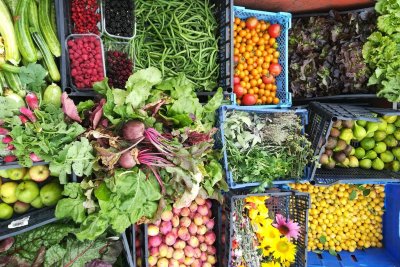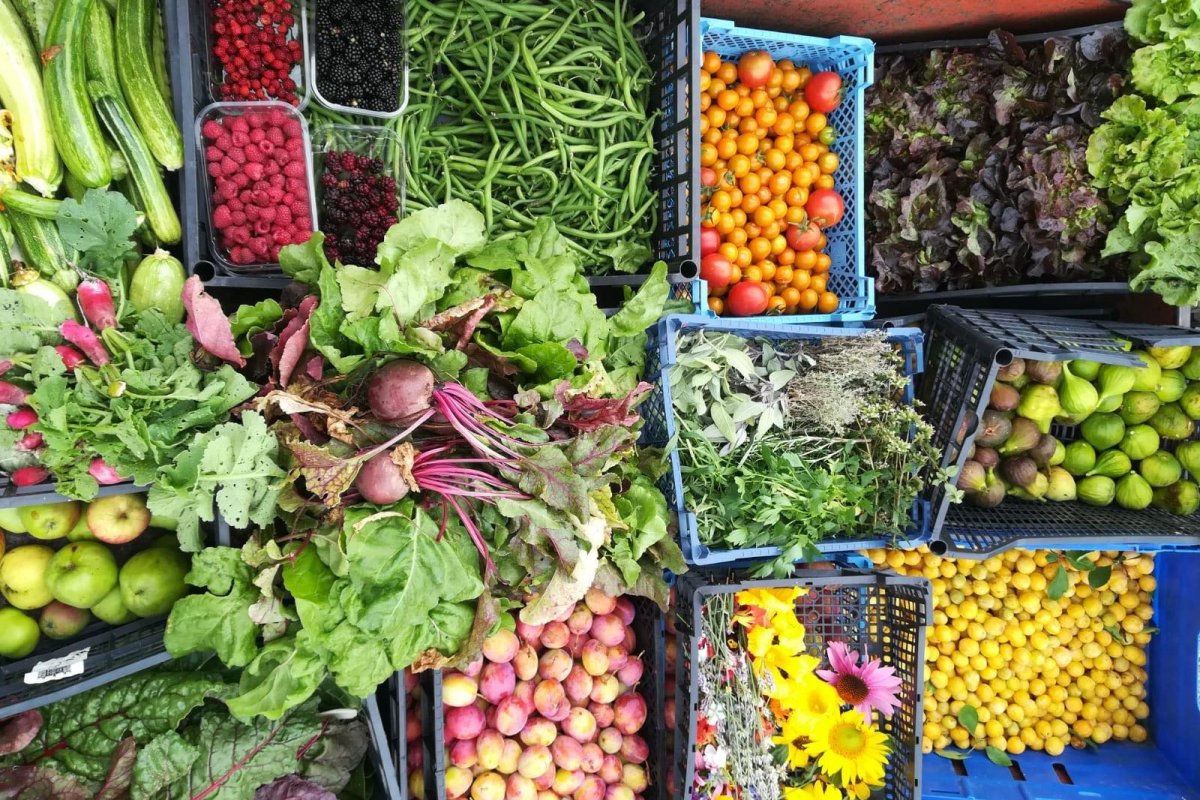 Fresh produce from Lincolnshire. Credit: Doddington Hall Farm Shop
Fresh produce from Lincolnshire. Credit: Doddington Hall Farm Shop
The food system in the UK is largely centralised. We get our food through long and complex supply chains, which don't pay farmers fairly and have shown themselves to be fragile and prone to risk, particularly when confronted with crises, as we saw in the early days of the Covid-19 pandemic and in response to Brexit. Food hubs are often looked to as a promising alternative: appropriate in scale to handle produce from shorter supply chains and smaller farms, they tend to be values-led, agile and resilient. They hold the potential to level out uneven power in food supply chains and improve access to more sustainable food.
But how exactly do you start a food hub? We’ve spoken to Laura Stratford, joint coordinator of the Greater Lincolnshire Food Partnership, who are just setting out on their ambition to create a network of food hubs in Lincolnshire. We wanted to find out how they’ve got things started, what they’ve learnt so far, and where they plan to go next.
Why a food hub?
Oxford Real Farming Conference is often the place where new ideas take hold, and this was no different for the coordinators of Greater Lincolnshire Food Partnership. The big takeaway for them? That a boom in agroecological production requires supply chains to get the goods to customers. This part of the equation has not had the same attention, historically, as the part about food growing, and so has become known as the ‘missing middle’. In Laura's words:
“Food hubs are not just about resilience. They attempt to address some of the deep and fundamental flaws in the food system, such as economic and power inequalities, the disconnect between people and food, the climate and nature emergencies, and environmental sustainability amongst other things.”
Lincolnshire produces a lot of food, and exports a great deal of it. However, they’re not totally without local routes to market: there are several markets, farm shops, veg box schemes, independent bakers, grocers, butchers, not to mention the local food provision at the Lincolnshire Co-op. But in a large rural county, the bounty and diversity of foods that are produced locally is not accessible, affordable or convenient for a lot of people, and there can be a prevalence of high-end products that don’t necessarily translate into meeting the dietary needs of local communities.
So, the food partnership decided to try to develop cooperation around direct routes to market, through food hubs. Food hubs, they say, are a great way of encouraging collaboration and mutual support across the local food system, without compromising producer autonomy. They can reduce costs, giving local producers a fairer share of profits, and making local, sustainable food more affordable as well as easier to access.
Where do you start?
The food hub model used in Cambridgeshire was a big source of inspiration for the team in Lincolnshire, as well as the accompanying book, Duncan Catchpole’s ‘Local Food Ecosystems: How Food Hubs Can Help Create a More Sustainable Food System’. The firm theoretical grounding in concepts like circular economy and Doughnut Economics combined with the real-life, thriving food hub so close-by made for a particularly persuasive combination. Despite this, there are some contrasts between the contexts of Cambridgeshire and Lincolnshire.
According to Duncan’s book, three things are required to set up a successful food hub:
- A supportive council
- Diverse suppliers
- An anchor organisation (e.g. Cambridge Organic) that can host a more complex hub
Lincolnshire does not have a close equivalent to Cambridge Organic, which is a large, well established, organic box scheme but it does have a variety of food enterprises across the county. While there are questions over whether there are currently enough organic farms in Greater Lincolnshire producing food in the sustainable way that hubs are intended to support and promote, the plan is that food hubs would provide opportunities and encouragement for local farmers to transition to organic and regenerative practices.
Council support is a particular strength in Lincoln. Many local authorities are just at the start of their journey in thinking about how their local food system can be good for people and planet, but the Climate Change Manager in Lincoln City Council is on the case and keen to address this in collaboration with the food partnership.
How do you gain support?
Having established a connection with the council and other key partners, and securing a Food for the Planet campaign grant from Sustainable Food Places, the food partnership arranged a series of events to turn this interest into engagement.
The partnership, with support from Duncan Catchpole, hosted an all-day interactive workshop with 18 local food enterprises. A further 35 local food businesses were not able to attend but requested to remain in the loop. According to Duncan Catchpole:
"The workshop was not only well attended by a good selection of relevant stakeholders, the participants also engaged positively and with enthusiasm. I picked up on high levels of respect and appreciation towards Greater Lincolnshire Food Partnership for convening the event, as well as a (at points emotional) sense of hope and excitement that the workshop might lead to something tangible that would fulfil an unmet need and support what the participants are trying to achieve in their respective enterprises.
Towards the end of the workshop, one participant voluntarily asked the rest of the attendees who, if any, would be interested taking things to the next stage and everybody put their hand without hesitation. This is a fantastic indication of the level of buy-in that could be expected if Lincoln were to go forward with a Food Hub project.
Prior to the workshop, the food partnership hosted dinner with key stakeholders; Duncan was on a panel discussion on local food hosted by the Stokes (Lincoln’s famous coffee roasters) at their 120 year anniversary event with over 100 people; and the food partnership gave a presentation to representatives from the City & County Council, Climate Commission, Lincoln University, Lincoln College, Lincoln City Foundation and keystone Lincoln businesses. All the events were enthusiastically received.
The food partnership subsequently organised meetings between Duncan and a range of local food producers through in-person site visits and online conversations.
How do you keep going?
Reflecting on this, Laura Stratford says the events were very successful and were great for building momentum. With hindsight, it would have been even better to have had funding and capacity in place to immediately harness the energy and interest. Small businesses are stretched even thinner than usual now, and the food partnership was mindful not to convene more meetings without the guarantee of realistic funding to enable the project to move forward.
The support from the council was bolstered by the arrival at the food partnership of Julien Etienne, a food policy consultant and researcher. He provided further legitimacy to the idea in the eyes of the council and, thanks to his expertise, the City Council approached the food partnership with the offer to collaborate on a grant application for a piece of research into the feasibility of establishing a network of food hubs.
So, what do you recommend to others?
- Start with conversations with people who share core values and will be a committed group. A champion in the council has been invaluable to us.
- Build bridges. A proof of concept can be helpful, but it’s important to remain open, flexible and curious. Be responsive to your own context and moment in time. You may be surprised who else is interested, has great ideas and wants to contribute.
- As you get more engagement, it helps to have adaptable plans in place to maintain momentum.
- Be dynamic people. (Kimberley Bell from the Small Food Bakery gave us this advice) Inspire others, and build a movement not just a business or CIC.
Find out more about Greater Lincolnshire Food Partnership here.
Get the ball rolling on your own Food for the Planet campaign here.
Food for the Planet: Food for the Planet is helping local authorities, businesses and organisations take simple actions to tackle the climate and nature emergency through food.
Sustain
The Green House
244-254 Cambridge Heath Road
London E2 9DA
020 3559 6777
sustain@sustainweb.org
Sustain advocates food and agriculture policies and practices that enhance the health and welfare of people and animals, improve the working and living environment, promote equity and enrich society and culture.
© Sustain 2024
Registered charity (no. 1018643)
Data privacy & cookies








